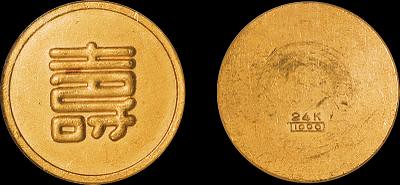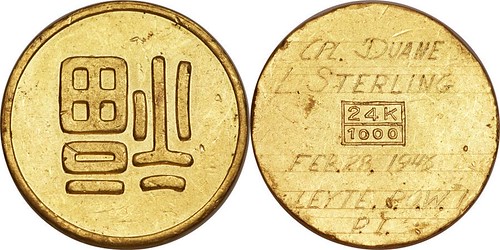
PREV ARTICLE
NEXT ARTICLE
FULL ISSUE
PREV FULL ISSUE
QUERY: PHILIPPINES WW II GOLD MEDALLIONS
Bruce Smith submitted these thoughts on Philippines WWII gold medallions. Thanks! Can anyone help?
-Editor

I believe there are a number of E-Sylum readers interested in World War II and the Philippines. I ran across something they may be interested in and which I had not heard of. In the book, Formosa Betrayed, by George H. Kerr (1965) there is a curious account of some gold "bars" made in Japan for Japanese officers in the Philippines (pages 91-92): "In November [1945] it began to be rumored that gold bars worth more than a half million U.S. dollars had disappeared while in transit from the Japanese military offices to the Chinese headquarters. They were part of a gold shipment which had been sent from Tokyo to pay the Japanese forces in the Philippines, but had moved no farther than Formosa. Each gold medallion, wrapped separately, had its own serial number. They had been double checked carefully before witnesses as they were handed to an American officer. But when they were delivered to the Chinese and again checked carefully, they were no longer in serial order and quite a number were missing. The Chinese promptly lodged charges and prepared to sue for recovery. The American officer who had carried them from one headquarters to another suddenly disappeared, secured an emergency "hardship" discharge from the services at Shanghai and left China." Though they are at first called bars, the description refers to them as medallions, suggesting they were round. What were these pieces? Could these be the gold bullion pieces attributed to Manchukuo, which have only a single Chinese character on the obverse and the fineness on the reverse? Kann claims the Manchukuo pieces were made in 1932, but correspondence in the 1950's from the Osaka Mint says they were actually made there in 1944. Perhaps these pieces were really made for the Japanese military in the Philippines, but the stolen ones ended up in China with a cover story about Manchukuo? Does anyone have any further information? If you google "Manchukuo gold coin" using Google Images, a few of the Manchukuo gold bullion pieces will come up. Interestingly, one of the pieces which came up is engraved with the name of a U.S. POW in the Philippines, and dated 1946. Could this be more evidence that these pieces were really intended for the Philippines and not Manchukuo? Or just a coincidence. The engraved piece turned up in an auction two years ago. As far as I know, it is the only engraved piece ever seen. Oh yes, the obverse (with one big character) is upside down; the reverse is correct.

Heritage Auctions, Inc. | Heritage 2012 September 6-11 Signature World & Ancient Coin Auction - Long Beach #3020 | 6 - 11 September 2012 Manchukuo. Gold Tael ND (1932), KMX-1.1, L&M-1067, cleaned XF with numerous small surface marks, engraved on the reverse as "CPL. Duane Sterling, Feb 28, 1946, Leyte, POW, P.I. (Philippines). Sold as is, no return lot. AGW 1.0047 oz. THE BOOK BAZARREWayne Homren, Editor The Numismatic Bibliomania Society is a non-profit organization promoting numismatic literature. See our web site at coinbooks.org. To submit items for publication in The E-Sylum, write to the Editor at this address: whomren@gmail.com To subscribe go to: https://my.binhost.com/lists/listinfo/esylum All Rights Reserved. NBS Home Page Contact the NBS webmaster 
|